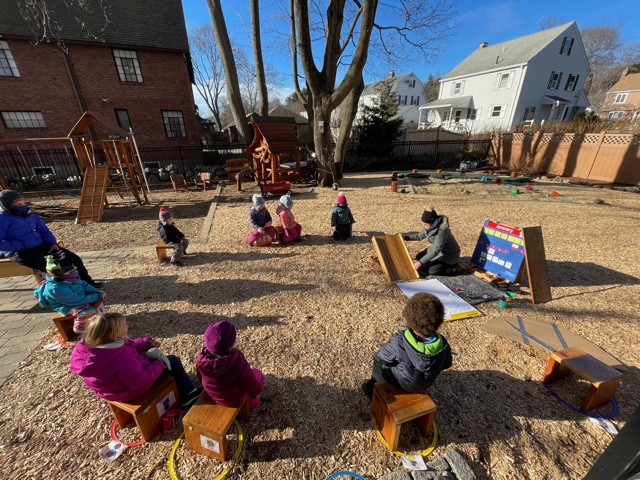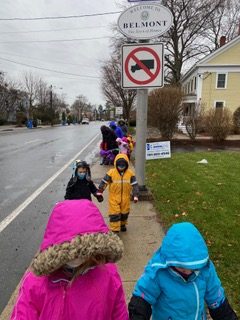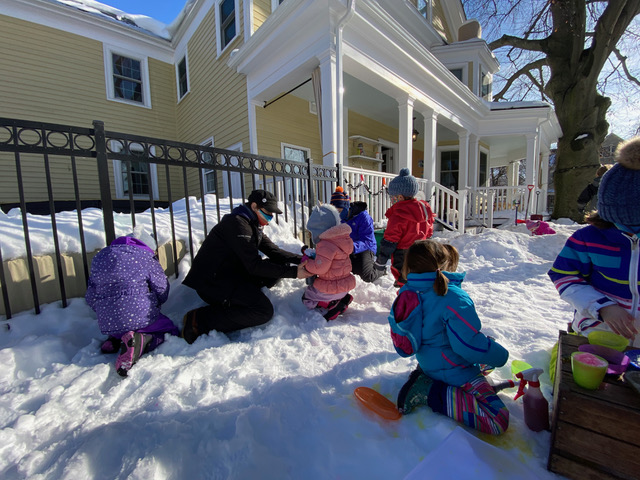By Iris Ponte
Image by via the author
I wake up in the morning, and the first thing I do is check the outdoor temperature. As a preschool educator, I used to think 30 degrees was cold. Not anymore. Our school has opened in 17 degrees, multiple times. We have learned to layer, eat warm foods in thermoses, and keep moving. I was not trained to be an outdoor educator, but I have learned to embrace it. In fact, I don’t think I will ever be able to work with children again without prioritizing the outdoors.

Our preschool, The Henry Frost Children’s Program is in Belmont MA, is right outside of the city of Boston. We serve ten families in a restored early 1800s farmhouse, with a staff of three full time teachers, and one extended day teacher. Our school philosophy has developed an approach called “Complementary Curriculum” that combines the wisdom found in the best of Montessori, Reggio Emilia, Vygotsky and Dewey. The farmhouse has a beautiful wrap around porch that has been transformed into our outdoor classroom area. The school also boasts a generous outdoor playground that has a wooden playhouse, climber, and gigantic sandbox.
When our country plummeted into the darkness of COVID-19, we knew our young learners could not stay home and learn on a screen. Our teaching team was determined to find a safe way to bring our students and staff back. The only answer for our school community was the outdoors. We knew that to reduce the risk of COVID-19 transmission, we had to have the full ventilation found only in the outdoors. We also knew that when outside, the children could enjoy a more normative preschool experience, without the anxiety around the risks of being inside together.

The fall season passed without many challenges. The weather was on our side, warm days to help us enjoy play with the hose and our outdoor block set. And we kept busy during choice time on the porch. Of interest to us all, the local squirrels seemed to know when our snack time was over.
The real challenges surfaced as the temperatures dropped, and we were faced with the cold New England winter. Our entire school community had to quickly figure out the best clothing for our bodies. Layering, mittens instead of gloves, how to stay warm and dry when the rain fell, all became critical. We also had to learn to modify our day to the cadence of nature. Cold morning arrivals called for more active time, and we waited for meeting time until the sun was at its highest point. We use tents with wind wall inserts, and warm foods to help us pull through the day, warming us from within. It is amazing to see the transformation of our entire community. The children have adapted and adjusted in ways we could never have imagined. They cheer when we have ice rain, and they cannot wait to see how the snow transforms our playspaces.

Currently, we have taken to leaving our school grounds to “scout.” With full waivers from the families to take the children for daily walks, our school neighborhood has become our classroom. We have found dead end streets to explore, cul-de-sacs to run around, and welcoming neighbors’ yards to explore. A fallen branch becomes our new climber, a deep puddle a space to jump, and a decomposing stump a space of wonder. Our curriculum has taken a whole new dimension as we push away the boundaries of our school walls, play yard fence, and explore beyond. We have learned that weather is to be embraced, the seasons to be understood, and for the first time in my life, I have been teaching young children completely outdoors for five hours a day. My awakening is that not only is it possible, but it is also joyful. I have laid witness to watching the stress of this terrible pandemic melt away as the natural world freezes up and offers comfort, beauty, and hope.
Our school community will always remember 2020 as the year of COVID-19, but we will also remember this year as the time when our entire school community found a way to be with nature, enjoy it, and respect it. Now the question is, when COVID-19 is over, how will we move forward with this new knowledge and our new skills?
Iris Ponte, Ph.D. is director of the Henry Frost early childhood center in Belmont, Massachusetts. She is widely respected for her consultation with and writings for other early childhood educators, and for the generous ways she supports all those who care about and for children.


You helped me a lot with this post. I love the subject and I hope you continue to write excellent articles like this.